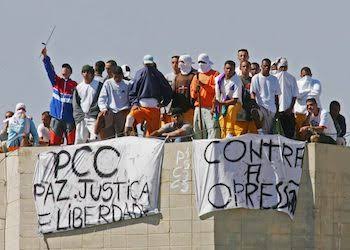The P.C.C. (Primeiro Comando da Capital), once considered a mere street gang, has evolved into a transnational criminal empire.

Its influence spans borders, impacting not only Brazil but also neighboring countries.
Will Freeman, an expert on Latin American organized crime, argues that the only way for Brazil to combat this escalating threat is to treat the P.C.C. as the powerful illicit enterprise it has become, rather than the local gang it once was.
For years, Brazilian authorities underestimated the P.C.C.'s rapid transformation from a prison-based organization into a major player in the drug trade and international crime.
What was once seen as localized violence has now morphed into a sophisticated operation with ties to cartels, human trafficking, and illegal arms dealing.
The group's expansion has been driven by the drug trade, which has allowed it to finance activities across multiple countries.
As the P.C.C. continues to gain power, its operations are affecting not only local communities but also global markets.
In a piece by Shegzeblog, Freeman emphasizes the urgency of addressing this issue: "If Brazil’s authorities treat the P.C.C. as the illicit transnational mega-business that it is not the street gang it once was there is still a chance Brazil might curb the group’s power in time."
His statement underscores a growing concern among experts that Brazilian law enforcement may be ill-equipped to tackle this new challenge.
Simply relying on traditional anti-gang strategies will not be enough to dismantle an organization with such deep international connections.
Freeman and other analysts suggest that to truly disrupt the P.C.C.'s operations, Brazilian authorities need to adopt more comprehensive approaches that involve cooperation with other nations, especially those impacted by the P.C.C.'s cross-border crimes.
Efforts must go beyond police crackdowns, incorporating economic and social reforms aimed at curbing the recruitment of young people into the criminal network.
The P.C.C. originated in São Paulo's prison system in the 1990s, formed by a group of inmates who sought to protect themselves from the brutal conditions inside.
What started as a self-defense organization soon turned into a gang that controlled much of São Paulo's criminal underworld.
Over the years, the P.C.C.'s influence grew exponentially as it expanded beyond the prison walls, infiltrating local communities and gaining control of major drug trafficking routes.
The group's rise was also fueled by its ability to operate in the shadows, taking advantage of Brazil's overcrowded and underfunded prison system.
Inmates would recruit new members inside, and once released, these individuals would continue to work for the gang on the outside.
This cyclical pattern allowed the P.C.C. to maintain a steady stream of operatives and financial resources.
However, in the past decade, the P.C.C. has evolved from a domestic gang into a sophisticated criminal network that operates in countries across Latin America.
Its influence extends to Paraguay, Bolivia, Colombia, and even as far as Europe.
The group has established itself as a major player in the global drug trade, smuggling cocaine from South America to Europe and beyond.
The International Impact as seen the P.C.C.'s operations outgrown their limit to Brazil.
In Paraguay, for example, the group has gained significant control over the country's drug trade, using it as a base to smuggle narcotics into neighboring countries and overseas.
The P.C.C.'s presence in Bolivia and Colombia has also raised concerns about the group's influence on the region's already volatile drug trade.
In Europe, authorities have uncovered P.C.C. operations that involve the smuggling of cocaine into major ports like Rotterdam and Antwerp.
The group has reportedly formed alliances with European crime syndicates to distribute drugs throughout the continent.
These developments have alarmed law enforcement agencies, as the P.C.C.'s growing power poses a threat to global security.
The Brazilian government has been slow to respond to the P.C.C.'s transformation into an international criminal empire.
While there have been efforts to crack down on the group's activities, these have largely been reactive rather than proactive.
In recent years, Brazilian authorities have conducted raids on P.C.C. strongholds and arrested high-ranking members, but these actions have done little to disrupt the group's overall operations.
One of the key challenges facing Brazil is the lack of coordination between law enforcement agencies and international partners.
To effectively combat the P.C.C., experts like Freeman argue that Brazil must work closely with neighboring countries and global law enforcement agencies to share intelligence and coordinate operations.
This includes strengthening border security, cracking down on money laundering networks, and disrupting the flow of weapons and drugs.
Despite the challenges, there is still hope that Brazil can curb the P.C.C.'s power.
Freeman's call for treating the P.C.C. as an international mega-business rather than a local gang offers a potential path forward.
By recognizing the group's true nature, Brazil can adopt more effective strategies to dismantle its operations.
This will require a combination of law enforcement efforts, social reforms, and international cooperation.
Brazil must also address the root causes of the P.C.C.'s rise, including poverty, unemployment, and corruption, which have created a fertile ground for the group to recruit new members.
The P.C.C.'s rise from a prison gang to a transnational criminal organization is a stark reminder of the challenges Brazil faces in combating organized crime.
As the group continues to expand its influence, the need for a coordinated, comprehensive response becomes more urgent.
Only by treating the P.C.C. as the global criminal empire it has become can Brazil hope to curb its power and protect its citizens from the group's far-reaching impact.
This reflects the evolving nature of the P.C.C. and highlights the steps Brazil must take to combat the group effectively.
